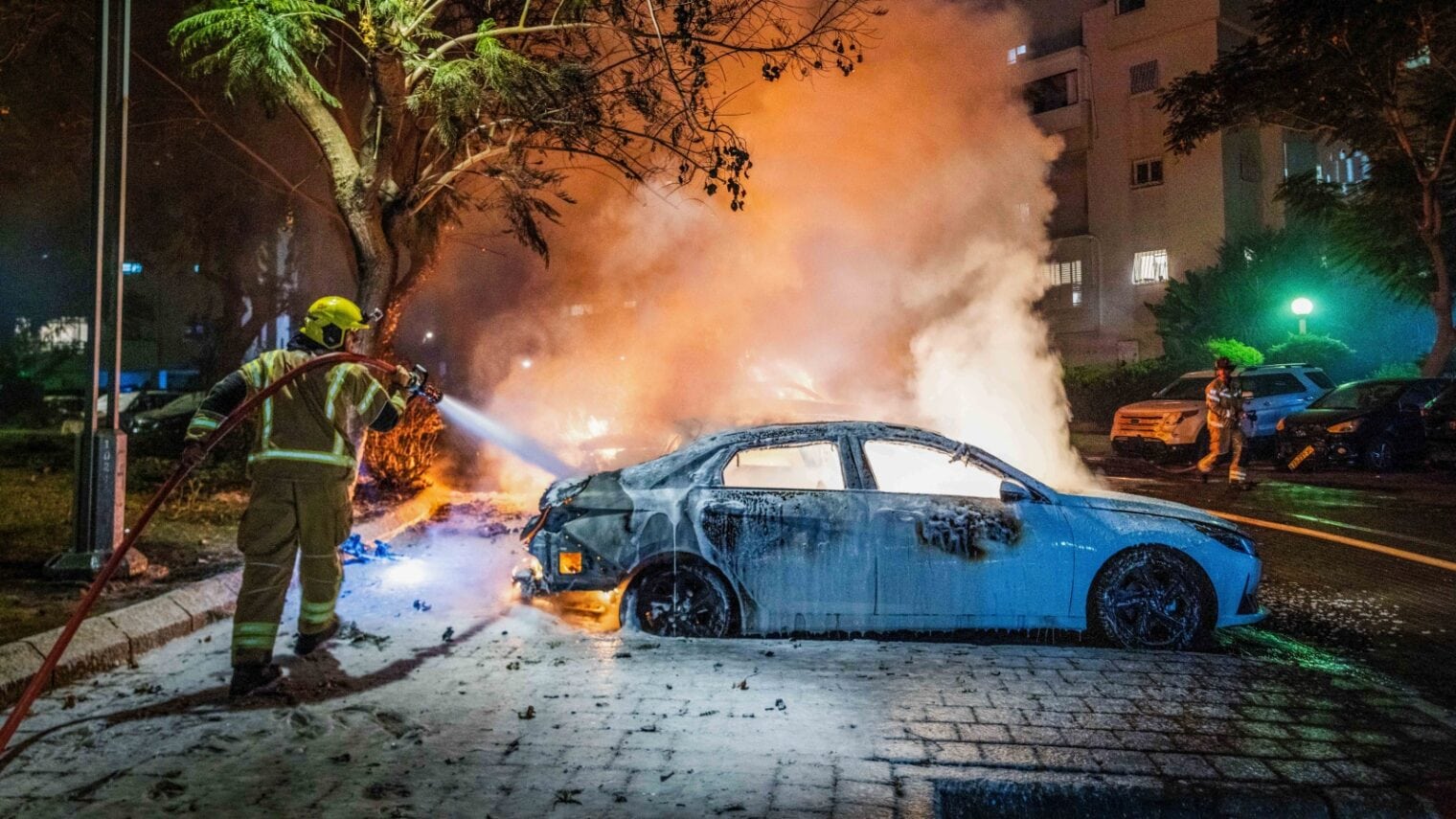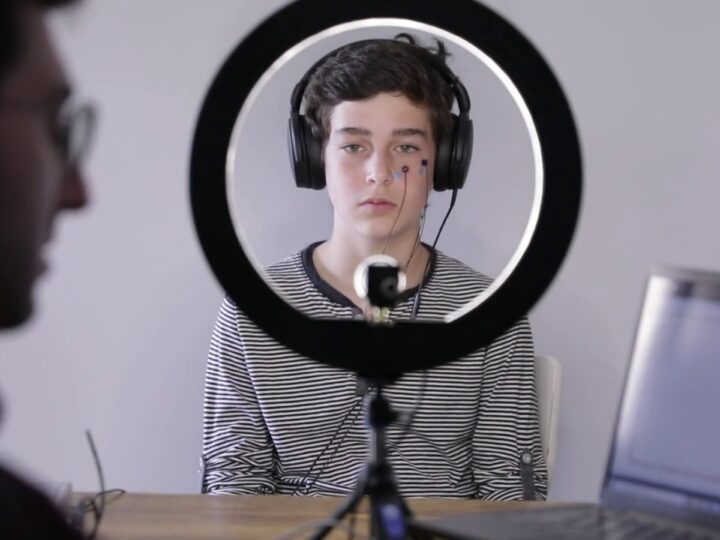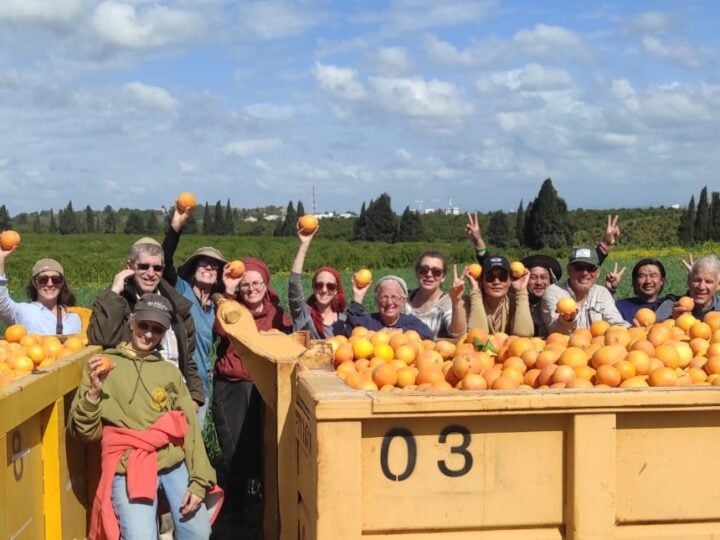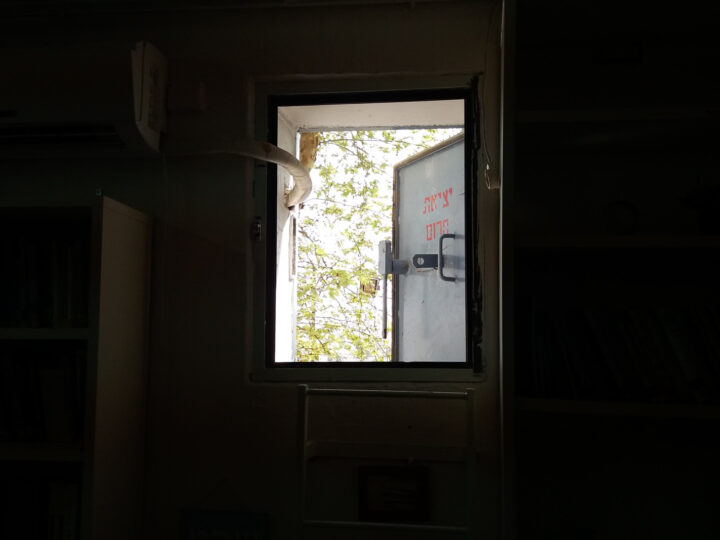Saturday, 7 October
Day 1
My alarm clock rings. I grapple to switch it off, and begin to remember why I’d set it for such an early hour: I’m going to visit my granddaughter, some 20 minutes’ drive south of Tel Aviv. My son says she’s beginning to crawl forwards now – not always, but for every few failed attempts in reverse-mode she now manages to get one right – just for a few seconds or so.
But it isn’t my alarm clock ringing; my son is calling.
“We’re okay!”
That’s all he says, but I get it. The subtext is all too familiar; something terrible is happening. Every Israeli knows that within seconds of a terrorist attack – or any other life-threatening situation — phones across the country will ping with newsflashes and parents, children, partners and friends will be desperate to hear the words “We’re okay.”
It’s 6:33 on Saturday morning, the festival of Simchat Torah. My phone fills with red alerts. I am instantly wide awake.
By 6:40, my husband and I are sitting glued to the radio, then the television. We watch and worry — as missiles rain down on the town where our son lives, and on numerous cities and villages in southern and central Israel. In between barrages, we hear from our daughter-in-law that she’s staying in their safe room with the baby all the time, but that our son has managed to dash in and out several times to grab necessities.
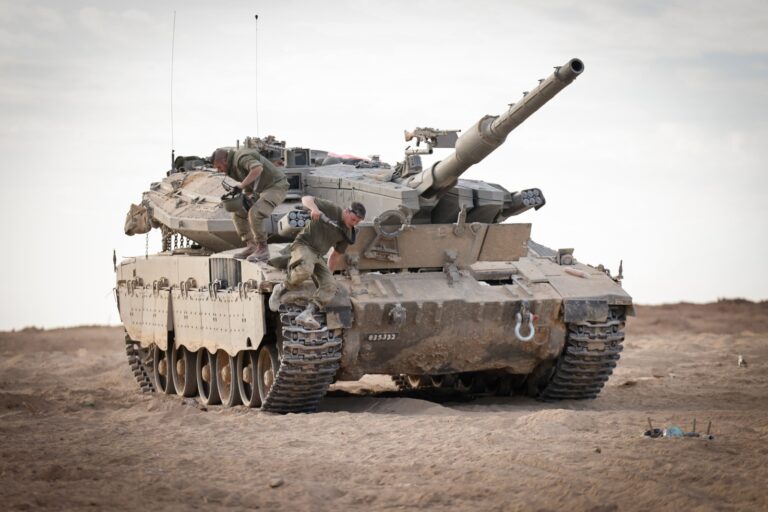
Shortly after, we hear on the television that a missile evaded the Iron Dome interception system. The missile landed near the base of the building, damaging a kindergarten in our son’s town. We call our son. My shoulders and neck are getting stiff from all the tension.
“Things flew off the walls in the lounge,” he says. “But we’re fine; we were in the safe room with the door closed.” Later he sends us a video of the damage beneath their building. Thankfully it’s Saturday, so the kindergarten was empty.
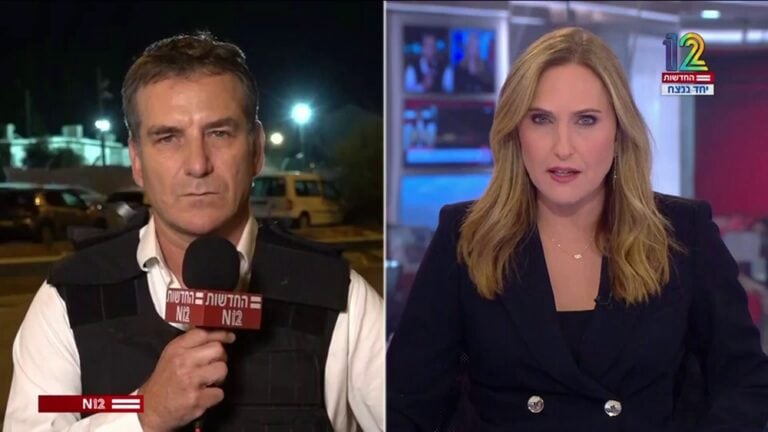
We call our daughter, who’s about to return from a holiday in Cyprus with her boyfriend. They don’t know if their plane will be allowed to take off – and if it is, whether it will be safe to approach and land. Her boyfriend has already been called up, and will join his unit as soon as they land. I can hear the tension in my daughter’s voice. I know I won’t breathe properly till I know they’ve landed safely.
Tel Aviv is under fire again. Our daughter’s apartment in an old building has no safe room. I decide to drive to meet her as soon as she’s landed and bring her to our place, further north, where at least for now things are calm – and we have a safe room. This is not the first, or even the second time I have driven under rocket fire to pick up one of my children.
Here in Israel, there are many in our neighborhood whose sworn aim is to annihilate us, and they like to remind us of this every now and then.
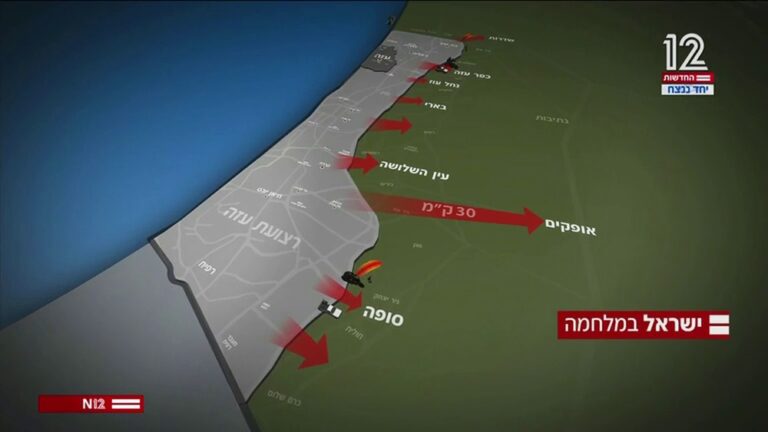
I set the Home Front Command app on my phone to alert me of any missile attack on my route. I prepare additional first aid for the glove compartment of my car, I pack a double supply of bottled water and some food. I also take a change of clothes and disinfectant wipes – because the last time I took a drive like this, there was a red alert in my location and, following safety instructions, I stopped my car and rushed to lie down in the ditch by the side of the road, which turned out to be wet and smelly.
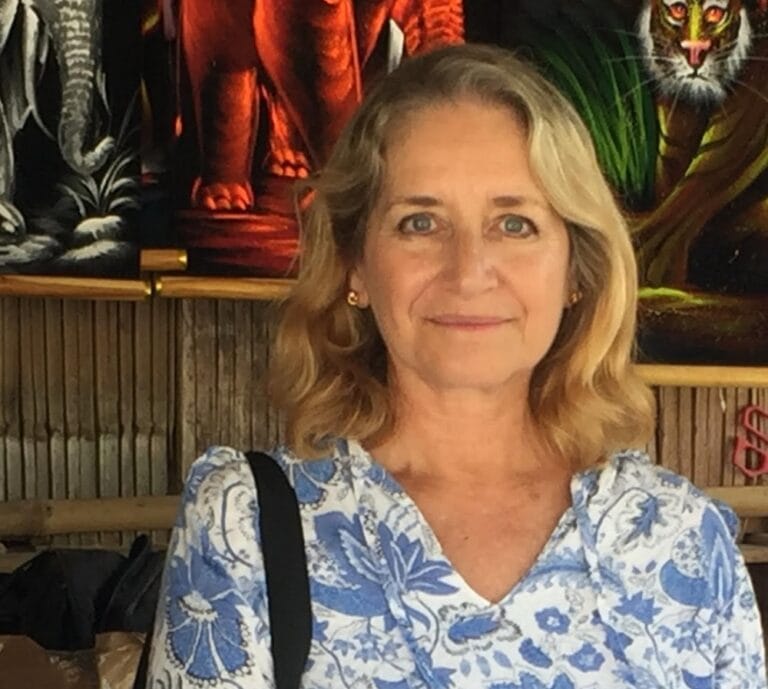
All the way to pick up my daughter I listen to my car radio. More and more reports of Hamas’ invasion, and of the atrocities they have committed, are emerging. Whole families slaughtered, many hostages taken, women raped, tortured, then executed. Carnage, mutilations, babies being murdered in the most barbaric ways. Horrific live footage is being posted on social media – by Hamas itself! How could this happen? How could we have been so helpless?
By Saturday evening, my daughter is safely with us, and we watch the news with tears in our eyes, as the magnitude of the unimaginable atrocities committed just inside the southern border region emerges. But there are also many stories of incredible bravery. After all these months of division in our society, Israelis are pulling together.
On Day 2 my son was called up, and I haven’t slept properly since then.
Every call or even the shortest text from him lifts our spirits. The rest of the time we worry. A daily telephone conversation with our daughter-in-law, and the fresh photos she sends us of our granddaughter boost our morale.
She tells us that the firm our son works for has been reaching out to the families of staff who have been mobilized, and even sent her a basket of goodies. It’s too risky for her to attempt the journey to us with the baby, even though things are calmer in our area. We decided to visit her as soon as possible – even if it means diving for shelter in a ditch by the side of the road on the way.
Around the country, mothers with small children whose partners have been mobilized are banding together to support each other logistically and emotionally. On our kibbutz, students and youngsters staying here with their parents during the war, our daughter included, babysit voluntarily for mums in this position, to give them respite or to enable them to go to work. Other volunteers cook meals for them to give them a boost.
On day 2, there was good news: My nephew had managed to escape from the Nova festival, where hundreds of young people were slaughtered, and others were taken hostage.
It was split-second decisions and perhaps a miracle that saved him and a handful of his friends. The instant the missiles began raining down from the skies, they made a run for their car, but a traffic jam developed on the road leading out of the festival grounds. Terrorists had started shooting people in the cars ahead of them.
Luckily, the car my nephew had come in was a 4×4, which enabled him and his friends to escape through the fields. The bodies of some of those slaughtered at the festival were severely mutilated.
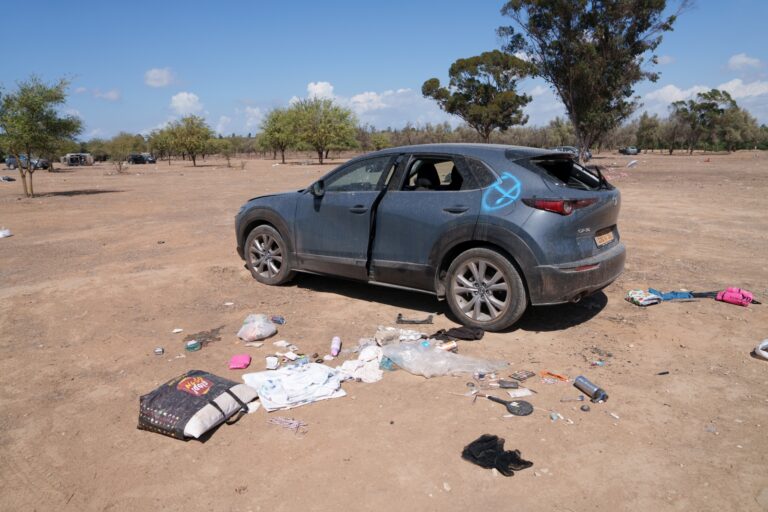
The identification process has been painstakingly long, and is still ongoing. DNA testing has been essential. Families have been suffering the agony of the worst kind of uncertainty for days, not knowing if their loved ones were dragged off to Gaza, or if their bodies haven’t yet been identified.
On Day 3 we finished stocking up our safe room, as the northern border continued heating up.
When I felt that we had done what we could to prepare ourselves for missile attacks in our part of the country, I went to volunteer at a collection center, sorting and packing items that civilians had donated to soldiers.
I sorted toiletries, socks and underwear, portable rechargers for mobile phones, vests and all manner of items that those called up might not have had time to pack before they set off. When I reached home afterwards, I cleared my cupboards of any surplus clothing, coats, bedding, towels, pillows, anything that families might need who had lost everything when their houses were burned down, bombed, or looted. I delivered it to another center where, again, scores and scores of volunteers were lining up to help. Everyone wants to feel useful, and all of us need to keep busy.
My husband has been frustrated all week because he’s too old to be called up, a harsh blow. He even responded to a call for volunteer gravediggers, a grim but urgent task that needed to be undertaken. But even that was oversubscribed. Such has been the dedication of ordinary people on the home front to do their bit.
On Day 4 I joined a long line of people responding to calls for volunteers and donations at a nearby animal shelter.
They needed kennels, blankets, old mattresses, dog and cat food, building materials and fences, so that they could cope with the tremendous number of dogs and cats that soldiers and civilians had rescued from the south. Some of the animals are traumatized and the owners of many are no longer with us. I delivered a carload of items that we had accumulated over the years, including the kennel our dog never once agreed to enter.
On Day 5 the wedding we were invited to was postponed because the groom was called up.
When friends in his unit and residents in the community he had reached heard this, they spontaneously prepared a feast and held the wedding right there – and, by chance, we ended up watching it on the news.
On Day 6 I travelled to the funeral of the daughter of a close friend.
And when missiles were fired at a town on my route, I sheltered in a ditch full of thistles and mosquitos by the side of the road, desperately sad.
Day 7 and 8 seem to have merged, but on Day 9 we went to another funeral.
This time, to that of a young woman, a friend of our daughter’s from the Scouts, who was murdered at the Nova festival.
On day 10 we took in an evacuee from the area next to the northern border, which has been erupting bit by bit.
Each day feels like a year – and contains at least a year’s worth of stress and emotion. Everyone says it’s hard for them to concentrate, or to remember what day of the week it is, or what happened yesterday. People end up missing appointments.
Life has to go on and a routine is crucial, but days seem to merge. I try to separate them to make some sense of the time that has passed. We are swimming in an ocean of grief — but swimming we are.
We are a resilient people who stick together in times of trouble, and we feel the duty to do so innately.
There is one image we saw early on day 10 that will never leave me. We had lost a set of car keys at the funeral the previous day, and retraced our steps at the cemetery in the hope of finding them.
There, a young man sat on an upturned bucket in front of the fresh grave, holding a take-away cup. He looked up at us, as we approached. I was ashamed we had disturbed him. We hadn’t thought of the possibility that there would be anyone there; it was around 7:15.
“Mishtatfim beh tzarhem,” I greeted him. We share your grief. He thanked me, but I could see he was wondering what we were doing there. I explained, embarrassed to be at the grave for something so mundane, but he smiled, glad to hear of our connection.
“I came to have my morning coffee with my sister,” he said.




